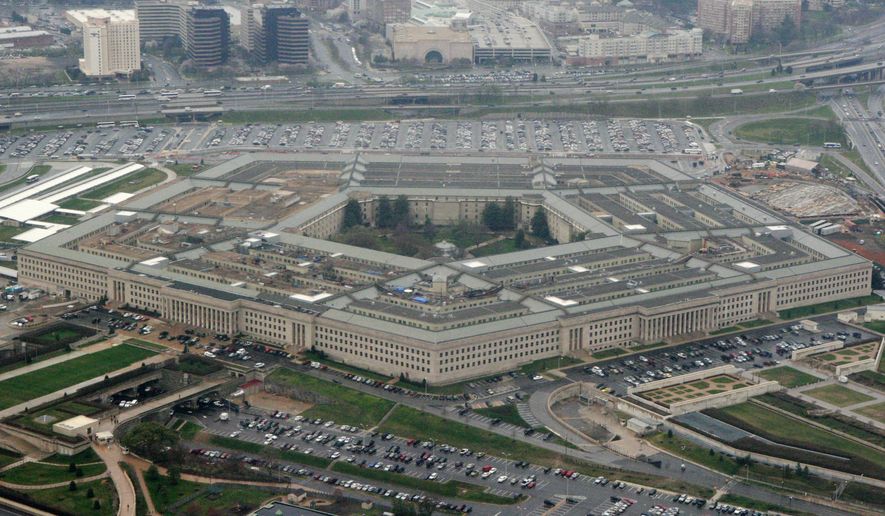The Pentagon has decided to disclose a piece of evidence it withheld from Trump-supporting analyst Adam Lovinger, who alleges his security clearance was revoked as retaliation for whistle-blowing.
The Pentagon originally said the evidence, an anti-Lovinger internal memo, was off limits. It turned over three blank pages to his attorney, who protested. The Pentagon relented Oct. 1 by providing the full document.
The memo could play a pivotal role in Mr. Lovinger’s appeal. It was written by Barbara Westgate, who directs the Washington Headquarters Services (WHS).
The memo was listed as evidence by the Pentagon’s Consolidated Adjudication Facility (CAF), which she oversees and which decided to yank Mr. Lovinger’s clearance. He was suspended without pay after a decade of Defense Department assignments.
“Mr. Lovinger violated security policies and regulations,” Ms. Westgate told the CAF arbiters.
Sean Bigley, Mr. Lovinger’s attorney, told The Washington Times he now knows that Ms. Westgate’s May 1, 2017, memo deemed his client guilty before the CAF issued its decision the following December.
“The CAF is supposed to be objective, evenhanded and removed from all outside influence,” he said. “That didn’t happen here because they were unduly influenced by their superiors at WHS, who directed, managed and rigged this case from Day One.”
Mr. Bigley contends that Ms. Westgate’s action was highly unusual. He said his law firm has represented clients in roughly 500 cases before the CAF over the past five years. He said he has never seen the WHS intervene with a predecisional guilty verdict. He likened it to unlawful command influence when a senior military officer influences a judge.
He surmised that the Pentagon decided to provide the memo now that Judicial Watch, a conservative watchdog group, has entered the fight on Mr. Lovinger’s side and is suing for documents.
“They had legal justification for withholding every word of the memo the first time, but now, after Judicial Watch sues on Lovinger’s behalf for other documents and they realize we’re not going to roll over, they suddenly cough up everything?” Mr. Bigley said in an email. “This is the standard playbook for government cover-ups. Over redact, over classify, and bury the embarrassing details. They knew exactly what the Westgate memo showed, which is why they hid it in the first place.”
Conservatives have suggested that Mr. Lovinger, a Trump supporter, is a victim of the “deep state” — Obama administration holdovers opposed to the president’s agenda.
The CAF’s 2017 ruling said Mr. Lovinger had violated a host of security rules. Pentagon spokespersons have told The Times that Mr. Lovinger was given full due process.
Mr. Bigley has requested a hearing before the Defense Office of Hearings and Appeals (DOHA). An independent administrative judge can recommend a CAF reversal. But then the final decision goes to Washington Headquarters Services, which already has said Mr. Lovinger is guilty.
The attorney accuses the Pentagon of “intentionally slow walking” his requests for all documents, such as the May 1 Westgate memo.
“They are now delaying and obstructing,” he said. “The DOHA hearing is the only player he gets with outside eyes.”
Mr. Lovinger worked in the secretive Office of Net Assessment (ONA), which writes about global threats and advises the defense secretary.
He transferred to the White House National Security Council staff to work for President Trump. But several months later, his assignment was revoked. He found himself under investigation by ONA for purported security violations. ONA Director James H. Baker then submitted his evidence to the CAF, which found him guilty.
Mr. Lovinger, who denies any wrongdoing, was suspended last May.
He had complained to Mr. Baker in 2016 about ONA’s costly academic-type studies that seemed to him to be a waste of taxpayer money.
He also complained about Stefan Halper, who has received more than $1 million from ONA to conduct such studies. Mr. Halper is a Cambridge professor who was paid by the FBI in 2016 as a secret informant to spy on members of the Trump campaign.
Mr. Lovinger has filed a complaint with the Pentagon inspector general.
The Consolidated Adjudication Facility’s December 2017 report came down hard on Mr. Lovinger. It said he played a role in leaking a news story on an Office of Net Assessment confidential report.
He also improperly tried to upgrade the security clearance for a contractor and misled superiors about it, the CAF alleged. He improperly accessed ONA computer files while at the White House. And he took a classified document on a commercial flight.
“You have mishandled U.S. government protected information including classified information, in ways the raise personnel security concerns,” the CAF report said. “Your actions raise doubt regarding your trustworthiness, judgment, reliability and willingness and ability to safeguard protected information, and therefore are of a security concern.”
Mr. Bigley said Mr. Lovinger “categorically denies” all the charges. He never leaked a story, Mr. Bigley said, and any help he gave a contractor was at the direction of Mr. Baker.
In a written rebuttal, the attorney said the CAF “recklessly relied upon assertions by proven liars.”
• Rowan Scarborough can be reached at rscarborough@washingtontimes.com.




Please read our comment policy before commenting.